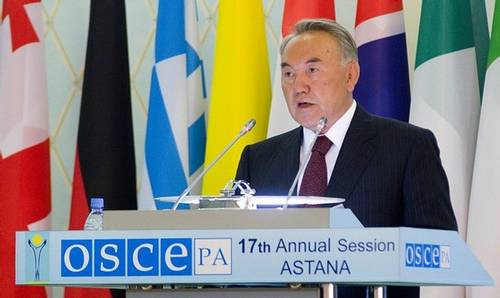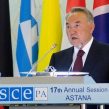
Possible Deliverables at the OSCE Summit in Kazakhstan
Publication: Eurasia Daily Monitor Volume: 7 Issue: 145
By:

(Part One)
Kazakhstan’s chairmanship of the OSCE, to be crowned by the summit of 56 heads of state in Astana, can hardly ignore Russia’s challenges to the post-Cold War international order (EDM, July 27).
Fortuitously, Kazakhstan’s chairmanship and the summit coincide with round anniversaries of the OSCE’s fundamental documents: the 1975 Helsinki Final Act and the 1990 Charter of Paris. Furthermore, this year’s Astana summit will be the first since the OSCE’s 1999 Istanbul summit, where the adapted treaty on Conventional Forces in Europe (CFE) and associated Istanbul commitments on Russian troop withdrawals were signed. Those documents add up to a normative inner core of the OSCE.
Russian actions, however, have systematically compromised those fundamental documents. Moscow has proceeded to change international borders by force, ultimately invading Georgia for that purpose. Russia also stations its troops in Moldova illegally; has most recently prolonged the Russian Black Sea Fleet’s basing in Ukraine, orchestrating local support to breach that country’s constitution; and it underwrites Armenia’s ongoing occupation of Azeri territories. Russia has unlawfully “suspended” its implementation of the CFE treaty and overtly repudiated its Istanbul commitments. Contrary to the OSCE’s concept of indivisible security (and despite Moscow’s own lip service to that concept in the Corfu process), Russia overtly claims a sphere of “privileged interests” in former Soviet-ruled territories.
While the OSCE’s comprehensive approach to security includes the economic dimension (Basket Two), the organization has completely ignored Russia’s use of economic tools for the strategic expansion of its influence. On democracy and human rights issues (Basket Three), Moscow has made it impossible for the OSCE’s Office of Democratic Institutions and Human Rights (ODIHR) to operate in Russia. This has forced the OSCE to stop on-site monitoring of Russia’s elections or of violence in the North Caucasus (Janusz Bugajski and Margarita Assenova, “Kazakhstan’s OSCE Chairmanship: Challenges and Opportunities,” CSIS/IND, July 2010).
It will be a difficult test for Kazakhstan’s chairmanship to prepare deliverables for the Astana summit in these circumstances (“Draft Decision on the Agenda, Organizational Framework, and Other Modalities of the OSCE Summit in Astana,” Kazakhstan OSCE Chairmanship, July 20). This summit can at least halt the OSCE’s further decline, but only if it avoids the adoption of meaningless documents that allow Russia to continue discrediting this organization. Most chairmanships have tended to regard the adoption of consensus-based political declarations, or country statements, as goals per se. They often turned such documents into criteria of success or failure for the year-end meeting and the chairmanship. Russia, however, vetoed those documents year after year, unless a vague wording rendered them irrelevant and compromised OSCE principles in the process.
Kazakhstan’s chairmanship need not fall into this familiar annual trap at the Astana summit. The chairmanship will probably seek to focus the summit agenda on Central Asian issues, largely novel to the OSCE. This could result in a relative de-emphasis of security issues in Europe and the South Caucasus, which held center stage at every annual meeting of the OSCE thus far (“Formulating an OSCE Summit Agenda: The Security Dimension,” CSIS/IND Task Force Policy Brief, July 2010).
Nevertheless, the Astana summit can formulate some significant deliverables on European and South Caucasus security issues without necessarily antagonizing Russia. The Kazakh chairmanship has a number of opportunities to coordinate relevant documents during the pre-summit drafting:
1. Abkhazia conflict: the OSCE played a distant second to the United Nations in handling the Abkhazia conflict until 2008. Russia evicted the UN from Abkhazia after the 2008 war, but tolerates a low-profile reporting role by the OSCE’s Office of the High Commissioner on National Minorities (HCNM, which operates in Georgia’s interior). This office monitors the situation of the Georgian population in the southern part of Russian-occupied Abkhazia, reporting on violations and abuses by local authorities and quietly seeking redress. Crucially, the HCNM is largely independent from Russia’s veto power in the OSCE Permanent Council. Given the absence of international organizations in Abkhazia at this time, the Astana summit can enhance the HCNM’s role by expressing political support for its monitoring of Abkhazia and endorsing an increase in its small funding and personnel.
2. South Ossetia conflict: the OSCE was the primary international organization handling the South Ossetia conflict until 2008. Nowhere has the OSCE been humiliated more consistently than in South Ossetia by Russian veto power, which reduced this mission to dwarf size, paralyzed its activities for 15 years, and ultimately evicted it during the 2008 invasion. The OSCE would be ill-advised to risk a repeat performance by seeking (as did the Greek chairmanship in 2009) to resurrect that mission on a miniature scale and under Russian veto power.




